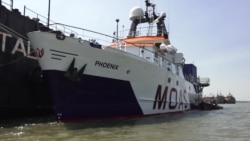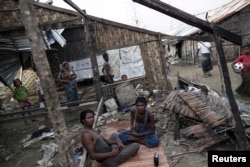An organization credited with rescuing 13,000 migrants stranded in the Mediterranean Sea says it is launching a new mission in Southeast Asian waters to aid Rohingya refugees who take to the seas. The operation in and near the Andaman Sea will use a ship and a pair of long-range drones to find vessels that may be transporting refugees or migrants.
“People do not deserve to die at sea,” Martin Xuereb, director of the Migrant Offshore Aid Station (MOAS), told VOA on Friday.
The initial MOAS mission in the region, to last a minimum of four weeks, will commence March 3 utilizing the M.Y. Phoenix, a 40-meter long rescue ship, coordinating with local coast guards, navies and other non-governmental organizations.
“We will work in full transparency with the authorities. If the need arises we will coordinate together to the best of our abilities,” said Xuereb, a former commander of the Armed Forces of Malta.
“The MOAS operations are impressive and the technology is state of the art, but MOAS can't do it alone,” said Matthew Smith, executive director of the Fortify Rights NGO. “Regional governments need to prioritize protection at sea and allow asylum seekers and migrants to disembark.”
Fortify Rights will be on board the Phoenix from next week “to support in monitoring irregular migration at sea and provide contextual guidance.”
“We're not sure how many people will take to the seas in the coming weeks or months,” Smith told VOA on Friday. “Trafficking syndicates have paused their operations, for the most part, but the human rights situation for Rohingya in Myanmar hasn't improved, so we can expect more people risking their lives at sea.”
The World Rohingya Organization has stated it believes as many as 200,000 Rohingya may attempt to leave Myanmar's Rakhine state this year.
The United Nations High Commissioner for Refugees estimated that 170,000 Rohingya and others have fled Myanmar and Bangladesh by sea since 2012, mostly heading to Thailand or Malaysia.
The perilous journeys can take weeks or months, if they arrive at all.
MOAS on Friday said its research indicates that perhaps 10 percent of Rohingya fleeing on ships never make it – making the fatality rate similar to those seen in other previous mass seaborne exoduses, such as the one at the end of the Vietnam War.
Wait and see in Myanmar
Some Rohingya, with little hope of employment or citizenship, are now reportedly waiting to see if their situation will improve under the new government in Myanmar, also known as Burma.
The National League of Democracy, led by Nobel Peace Prize laureate Aung San Suu Kyi, after its landslide electoral victory last November, is forming the country's first democratic government since 1962.
MOAS says it will operate in Southeast Asia “within the existing legal framework of the laws of the sea” and has had numerous discussions about its mission with the Malaysian and Thai authorities.
Thailand has been criticized for pushing the rickety boats of asylum seekers back out to sea towards Malaysia, after providing those on board with a minimal amount of food and water.
Malaysia and Indonesia have also intercepted and pushed boats back to open waters.
Aboard the MOAS ship, which is a former Canadian fishing boat, will be paramedics and physicians, as well as maritime, security, linguistic, migration, mapping and aviation experts.
Aerovel FlexRotor drones, with a range of 3,400 kilometers and which can stay airborne for more than 40 hours, will be operated by a U.S. company, Precision Integrated Programs.
MOAS began operating the first private rescue ship in the central Mediterranean in 2014 with a two-month operation off the Libyan coast.
The organization, funded by the general public, including numerous donors in the United States, was started in 2013 by an American philanthropist couple, Christopher and Regina Catrambone, after the lack of response to drownings off the Italian island of Lampedusa.
Zinlat Aung contributed to this report from Samut Prakan, Thailand.














